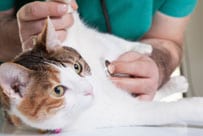Cat Vaccinations and Wellness Exams in Ormond Beach, FL
One of the common characteristics among cats is their ability to hide their illnesses, and since cats obviously can’t speak, it can be difficult to determine if there’s a health problem without a professional opinion. That’s why Cat Care Clinic in Ormond Beach recommends that all cats have a routine veterinary wellness exam at least once a year as a form of preventive care. Another important component of your cat’s overall wellness is vaccinations, which serve as protective measure against potentially fatal and contagious diseases. The best way to treat illness is to prevent it, so by staying up-to-date on your cats’ wellness visits and vaccinations, you can help them live their nine lives to the fullest.
About the Wellness Exam

The exam consists of a comprehensive nose-to-tail assessment to determine if there are any areas of concern, such as abnormal hair loss, a heart murmur, or dental disease. We also discuss your cat’s diet, behavior, and other aspects of their health, and we encourage you to let us know about any changes you’ve noticed in their health or behavior.
After the exam is complete, we use our findings to determine if any form of treatment, advanced diagnostic care (X-rays, ultrasound, etc.), or laboratory work (blood work, urinalysis, etc.) is needed. With a fecal analysis, we can test your cat for internal parasites, so please remember to bring a fresh sample in a plastic bag to the wellness exam. We can also discuss our recommendations for preventive medicine, including internal and external parasite control, and vaccinations to keep your feline friend healthy.
Why Does My Cat Need Vaccinations?
This is a common question of new cat owners. Vaccinations are given to cats to prevent many kinds of contagious diseases. Most of the vaccines prevent life-threatening illnesses in cats for which there is no cure. Vaccines work by giving your cat a small amount of the virus that stimulates their immune system so that when they encounter the real virus, their immune system is prepared to fight off the disease. Cats typically are given a series of vaccines as kittens and then are given boosters as needed throughout life.
At Cat Care Clinic, we recommend vaccines for your cats based on their lifestyle. We firmly believe that all cats do not need all vaccines every year! Some vaccines are required by law, such as rabies (even for indoor cats). Below is a list of the core vaccines that we recommend for our patients:
- Rabies: Rabies is a well-known, very serious disease that is fatal to cats. Cats (and people!) can contract rabies from any mammal infected with it. The primary carrier of rabies in Florida is the raccoon, but bats can also spread rabies. The usual route of transmission is by a bite. In Florida, more cats than dogs have been diagnosed with rabies in recent years.
- In Volusia County, cats are required by law to be vaccinated against rabies. At Cat Care Clinic we use the PureVax rabies vaccine, which is adjuvant-free. The rabies vaccine is a very effective vaccine, and if given to your cat on a yearly basis, will prevent them from contracting this fatal disease.
- Feline distemper (FVRCP): The FVRCP vaccine is actually a combination vaccine that prevents (or lessens) disease from three different viruses. These viruses can cause anything from chronic respiratory infections to fulminating, systemic disease that can lead to death. These diseases are highly contagious, being spread by contact with respiratory secretions or excrement. FVRCP is recommended for all cats tri-annually (every 3 years) after initial inoculation series.
- Feline leukemia (FeLV): Feline leukemia is a virus that is spread from cat to cat via close contact (e.g. mutual grooming, biting). Feline leukemia can cause anemia, a weakened immune system that leads to life-threatening infections, and tumors in various parts of the body. Cats that acquire feline leukemia typically die within two years of diagnosis.
- FeLV is usually spread by bite wounds, but can also be spread from queen (mother cat) to kitten. The FELV vaccine is highly recommended for all kittens and for cats that venture outdoors. At Cat Care Clinic, we use the PureVax leukemia vaccine, which is adjuvant-free.


